2014年高考英语试题(全国卷II)word 答案
2014-2017年高考英语试题第二卷
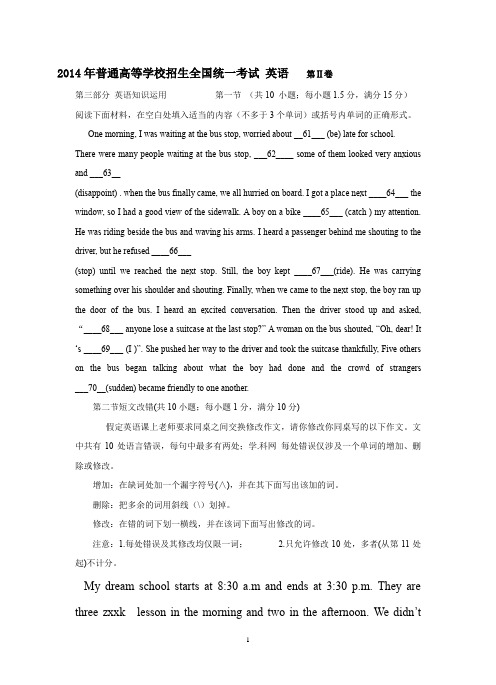
2014年普通高等学校招生全国统一考试英语第Ⅱ卷第三部分英语知识运用第一节(共10 小题;每小题1.5分,满分15分)阅读下面材料,在空白处填入适当的内容(不多于3个单词)或括号内单词的正确形式。
One morning, I was waiting at the bus stop, worried about __61___ (be) late for school.There were many people waiting at the bus stop, ___62____ some of them looked very anxious and ___63__(disappoint) . when the bus finally came, we all hurried on board. I got a place next ____64___ the window, so I had a good view of the sidewalk. A boy on a bike ____65___ (catch ) my attention.He was riding beside the bus and waving his arms. I heard a passenger behind me shouting to the driver, but he refused ____66___(stop) until we reached the next stop. Still, the boy kept ____67___(ride). He was carrying something over his shoulder and shouting. Finally, when we came to the next stop, the boy ran up the door of the bus. I heard an excited conversation. Then the driver stood up and asked,“____68___ anyone lose a suitcase at the last stop?” A woman on the bus shouted, “Oh, dear! It …s ____69___ (I )”. She pushed her way to the driver and took the suitcase thankfully, Five others on the bus began talking about what the boy had done and the crowd of strangers ___70__(sudden) became friendly to one another.第二节短文改错(共10小题;每小题1分,满分10分)假定英语课上老师要求同桌之间交换修改作文,请你修改你同桌写的以下作文。
2014年高考真题——英语(新课标II)word版含答案
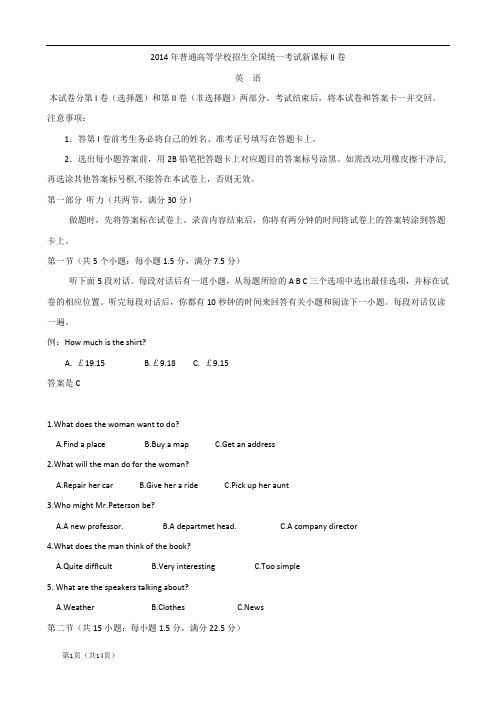
2014年普通高等学校招生全国统一考试新课标II卷英语本试卷分第I卷(选择题)和第II卷(非选择题)两部分。
考试结束后,将本试卷和答案卡一并交回。
注意事项:1.答第I卷前考生务必将自己的姓名、准考证号填写在答题卡上。
2.选出每小题答案前,用2B铅笔把答题卡上对应题目的答案标号涂黑。
如需改动,用橡皮擦干净后,再选涂其他答案标号框,不能答在本试卷上,否则无效。
第一部分听力(共两节,满分30分)做题时,先将答案标在试卷上。
录音内容结束后,你将有两分钟的时间将试卷上的答案转涂到答题卡上。
第一节(共5个小题:每小题1.5分,满分7.5分)听下面5段对话。
每段对话后有一道小题,从每题所给的A B C三个选项中选出最佳选项,并标在试卷的相应位置。
听完每段对话后,你都有10秒钟的时间来回答有关小题和阅读下一小题。
每段对话仅读一遍。
例:How much is the shirt?A. £19.15B.£9.18C. £9.15答案是C1.What does the woman want to do?A.Find a placeB.Buy a mapC.Get an address2.What will the man do for the woman?A.Repair her carB.Give her a rideC.Pick up her aunt3.Who might Mr.Peterson be?A.A new professor.B.A departmet head.C.A company director4.What does the man think of the book?A.Quite difflcultB.Very interestingC.Too simple5. What are the speakers talking about?A.WeatherB.ClothesC.News第二节(共15小题:每小题1.5分,满分22.5分)听下面5段对话或对白,每段对话或对白后有几个小题,从题中所给的A、B、C三个选项中选出最佳选项,并标在试卷的相应位置,听每段对话或独白前,你将有时间阅读各个小题。
2014年高考英语全国卷1-答案

2014年普通高等学校招生全国统一考试(全国新课标卷1)英语答案解析第Ⅰ卷第一部分听力第一节1.【答案】A【解析】由对话中女士说“This is the address. How do I find it?”可知女士想找个地方,故选A2.【答案】B【解析】由对话中男士说“I can drop you off on my way.”可知,男士将送女士一程,故选B.3.【答案】C【解析】由对话中男士说今天早上已经叫了各部门负责人到他办公室,他们需要向Mr. Peterson汇报工作。
由此可知,Mr. Peterson 是公司负责人,故选C.4.【答案】B【解析】由对话中男士说“…once I started I simply couldn’t put it down”可知男士认为书很有趣,故选B 5.【答案】A【解析】由对话中女士说都已经五月份了,还得穿御寒的衣服,男士说收音机广播了好消息,说不定从明天起女士就可以穿短裤了呢。
由此可知,谈话者在谈论天气,故选A.6.【答案】B【解析】由男士说“You know there is a basketball match on TV today. Let’s just stay home and watch it.”可知男士想要看电视,所以拒绝加入女士,故选B.7.【答案】C【解析】女士邀请男士一起打乒乓球,男士不想参加,女士最后说她和海伦一起打。
由此可知,女士接下来会做运动,故选C.8.【答案】A【解析】由“I should be home from work at 5:45.”,故选A.9.【答案】C【解析】女士说也许UME电影院七点的电影更好,Jacky Chan 主演的,男士说可以。
由此可知,谈话者要去UME电影院,故选C.10.【答案】A【解析】由“So we're leaving on Monday from Hartsfield International Airport…”可知答案.故选C.11.【答案】A【解析】对话中女士说公司安排了车送他们到机场,并且公司负责这次旅行的费用。
2014年高考英语真题(word版)——广东卷(试题+答案解析)

2014年普通高等学校招生全国统一考试(广东卷)英语试题本试卷共12页,三大题,满分135分。
考试用时120分钟。
Ⅰ.语言知识及应用(共两节,满分45分)第一节完形填空(共15小题;每小题2分,满分30分)阅读下面短文,掌握其大意,然后从1~15各题所给的A、B、C 和D项中,选出最佳选项,并在答题卡上将该项涂黑。
Parents feel that it is difficult to live with teenagers.Then again,teenagers have __1__ feelings about their parents,saying that it is not easy living with them.According to a recent research,the most common __2__between parents and teenagers is that regarding untidiness and daily routine tasks.On the one hand,parents go mad over __3__ rooms,clothes thrown on the floor and their children's refusal to help with the __4__.On the other hand,teenagers lose their patience continually when parents blame them for __5__the towel in the bathroom,not cleaning up their room or refusing to do the shopping at the supermarket.The research,conducted by St.George University,shows that different parents have different __6__ to these problems.However,some approaches are more __7__ than others.For example,those parents who yell at their children for their untidiness,but __8__ clean the room for them,have fewer chances of changing their children's __9__.On the contrary,those who let teenagers experience the __10__ of their actions can do better.For example,when teenagers who don't help their parents with the shoppingdon't find their favorite drink in the refrigerator,they are forced to __11__ their actions.Psychologists say that__12__ is the most important thing in parent-child relationships.Parents should __13__ to their children but at the same time they should lend an ear to what they have to say.Parents may __14__ their children when they are untidy but they should also understand that their room is their own private munication is a two-way process.It is only by listening to and __15__ each other that problems between parents and children can be settled.1.A.natural B.strongC.guilty D.similar2.A.interest B.ArgumentC.link D.knowledge3.A.noisy B.CrowdedC.messy D.locked4.A.homework B.HouseworkC.problem D.research5.A.washing B.UsingC.dropping D.replacing6.A.approaches B.ContributionsC.introductions D.attitudes7.A.complex B.PopularC.scientific D.successful8.A.later B.DeliberatelyC.seldom D.thoroughly9.A.behavior B.TasteC.future D.nature10.A.failures B.ChangesC.consequence D.thrills11.A.defend B.delayC.repeat D.reconsider12.A.communication B.bondC.friendship D.trust13.A.reply B.attendC.attach D.talk14.A.hate B.scoldC.frighten D.stop15.A.loving B.ObservingC.understanding D.praising第二节语法填空(共10小题;每小题1.5分,满分15分)阅读下面短文,按照句子结构的语法性和上下文连贯的要求,在空格处填入一个适当的词或使用括号中词语的正确形式填空,并将答案填写在答题卡标号为16~25的相应位置上。
2014高考新课标1全国卷英语试题和答案解析
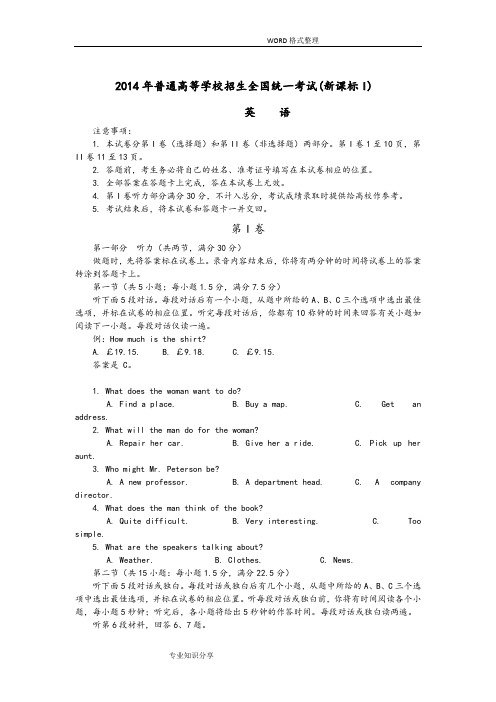
2014年普通高等学校招生全国统一考试(新课标I)英语注意事项:1. 本试卷分第I卷(选择题)和第II卷(非选择题)两部分。
第I卷1至10页,第II卷11至13页。
2. 答题前,考生务必将自己的姓名、准考证号填写在本试卷相应的位置。
3. 全部答案在答题卡上完成,答在本试卷上无效。
4. 第I卷听力部分满分30分,不计入总分,考试成绩录取时提供给高校作参考。
5. 考试结束后,将本试卷和答题卡一并交回。
第I卷第一部分听力(共两节,满分30分)做题时,先将答案标在试卷上。
录音内容结束后,你将有两分钟的时间将试卷上的答案转涂到答题卡上。
第一节(共5小题;每小题1.5分,满分7.5分)听下面5段对话。
每段对话后有一个小题,从题中所给的A、B、C三个选项中选出最佳选项,并标在试卷的相应位置。
听完每段对话后,你都有10称钟的时间来回答有关小题如阅读下一小题。
每段对话仅读一遍。
例:How much is the shirt?A. £19.15.B. £9.18.C. £9.15.答案是 C。
1. What does the woman want to do?A. Find a place.B. Buy a map.C. Get an address.2. What will the man do for the woman?A. Repair her car.B. Give her a ride.C. Pick up her aunt.3. Who might Mr. Peterson be?A. A new professor.B. A department head.C. A company director.4. What does the man think of the book?A. Quite difficult.B. Very interesting.C. Too simple.5. What are the speakers talking about?A. Weather.B. Clothes.C. News.第二节(共15小题:每小题1.5分,满分22.5分)听下面5段对话或独白。
2014年高考真题——英语(新课标I卷)含答案
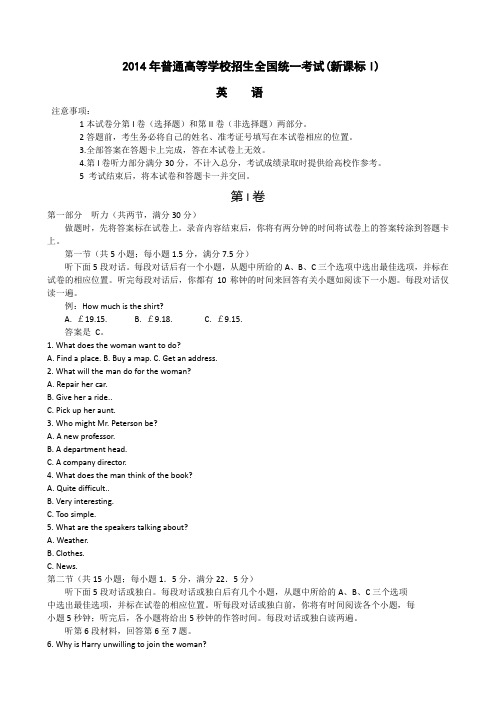
2014年普通高等学校招生全国统一考试(新课标I)英语注意事项:1本试卷分第I卷(选择题)和第II卷(非选择题)两部分。
2答题前,考生务必将自己的姓名、准考证号填写在本试卷相应的位置。
3.全部答案在答题卡上完成,答在本试卷上无效。
4.第I卷听力部分满分30分,不计入总分,考试成绩录取时提供给高校作参考。
5 考试结束后,将本试卷和答题卡一并交回。
第I卷第一部分听力(共两节,满分30分)做题时,先将答案标在试卷上。
录音内容结束后,你将有两分钟的时间将试卷上的答案转涂到答题卡上。
第一节(共5小题;每小题1.5分,满分7.5分)听下面5段对话。
每段对话后有一个小题,从题中所给的A、B、C三个选项中选出最佳选项,并标在试卷的相应位置。
听完每段对话后,你都有10称钟的时间来回答有关小题如阅读下一小题。
每段对话仅读一遍。
例:How much is the shirt?A. £19.15.B. £9.18.C. £9.15.答案是C。
1. What does the woman want to do?A. Find a place.B. Buy a map.C. Get an address.2. What will the man do for the woman?A. Repair her car.B. Give her a ride..C. Pick up her aunt.3. Who might Mr. Peterson be?A. A new professor.B. A department head.C. A company director.4. What does the man think of the book?A. Quite difficult..B. Very interesting.C. Too simple.5. What are the speakers talking about?A. Weather.B. Clothes.C. News.第二节(共15小题;每小题1.5分,满分22.5分)听下面5段对话或独白。
2014年全国高考英语试题及答案-辽宁卷

2014普通高等学校招生全国统一考试(辽宁卷)英语注意事项:1.本试卷分第卷和第卷两部分。
答卷前,考试务必将自己的姓名、准考证号填写在答题卡上。
2.作答时,将答案写在答题卡上。
写在本试卷上无效。
3.考试结束后,将本试卷和卡题卡一并交回。
第二部分阅读理解(共两节,满分40分)第一节(共15小题;每小题2分,满分30分)阅读下列短文,从每题所给的四个选项(A, B, C和D)中.选出最佳选项,并在答题卡上将该项涂黑。
AA new study shows students who write notes by hand during lectures perform better on exams than those who use laptops(笔记本电脑).Students arc increasingly using laptops for note-taking because of speed and legibility(清晰度).But the research has found laptop users are less able to remember and apply the concepts they have been taught.Researchers performed experiments that aimed to find out whether using a laptop increased the tendency to make notes "mindlessly" by taking down word for word what the professors said In the first experiment, students were given either a laptop or pen and paper .They listened to the same lectures and were told to use their usual note-taking skills. Thirty minutes after the talk , they were examined on their ability to remember facts and on how well they understood concepts.The researchers found that laptop users took twice as many notes as those who wrote by hand. However, the typists performed worse at remembering and applying the concepts. Both groups scored similarly when it came to memorizing facts.The researchers' report said, "While more notes are beneficial, if the notes are taken mindlessly, as is more likely the case on a laptop, the benefit disappears."In another experiment aimed at testing long-term memory, students took notes as before but were tested aweek after the lecture. This time, the students who wrote notes by hand performed significantly better on the exam.These two experiments suggest that handwritten notes are not only better for immediate learning and understanding, but that they also lead to superior revision in the future.21. More and more students favor laptops for note-taking because they can . .A. write more notesB. digest concepts betterC. get higher scoresD. understand lectures better22. While taking notes, laptop users tend to be . .A. skillfulB. mindlessC. thoughtfulD. tireless23. The author of the passage aims to . .A. examine the importance of long-term memoryB. stress the benefit of taking notes by handC. explain the process of taking notesD. promote the use of laptops24. The passage is likely to appear in . .A. a newspaper advertisementB. a computer textbookC. a science magazineD. a finance reportB(Q = Question; A = Answer)Situation IQ: If someone sits right next to me in an empty movie theater, is it rude to move?A: Maybe, but nobody will fault you for it. Chances are that close sitter doesn't realize he disturbs you, so he maymiss your annoyance. You undoubtedly aren't the first person he's met who needs enough room. Forgive hisbad judgment, move quietly and enjoy the show.Situation IIQ: If I use the bathroom at a store, do I need to buy something?A: Consider frequency and urgency. Is this a one-time or an emergency? If so, you don't have to buy anything, butit would be kind if you did. However, if you regularly use the bathroom at this place, then you are acustomer,and you should act like one.Situation IIIQ: If someone is talking loudly on the bus, is there a nice way to ask him to keep it down?A: No. Try other means.1) Stare at him until he gets aware of it and quiets down. 2) Lift your finger in a silencemotion(动作)and smile. 3) Put on earphones and ignore him.Situation IVQ: If I remember my friend's birthday a day late, should I apologize or just wish her a happy birthday like nothinghappened?A: This is the reason why the word belated was invented. "Happy belated birthday!" is short for: "Well, I know Iforgot, but then I remembered. Forgive me and happy birthday."Situation VQ: Can I lie about seeing a text because I was too busy or lazy to respond(回复) to it?A: Don't lie. Receiving a text does not mean you need to respond to it. Why waste a perfectly good lie when thetruth will serve? "Yes," you can say if ever asked, "I saw it." No explanation is needed as to why you don'trespond.25. You will get annoyed in a theater when . .A. a person is too activeB. a person is too rude to youC. a person talks too loudlyD. a person sits too close to you26. How will you quiet someone down in a public place?A. By making fun of him continuously.B. By looking purposefully at him.C. By talking to him directly.D. By pointing angrily at him.27. The underlined word "belated" in Situation IV probably means ..A. predictedB. returnedC. cancelledD. delayed28. What is the passage mainly about?A. Modern ways to mind your manners.B. Different ways to change others' manners.C. Proper manners to offer help to others.D. Good manners to talk to people.CWould it surprise you to learn that, like animals, trees communicate with each other and pass on their wealth to the next generation?UBC Professor Simard explains how trees are much more complex than most of us ever imagined. Although Charles Darwin thought that trees are competing for survival of the fittest, Simard shows just how wrong he was. In fact, the opposite is true: trees survive through their co-operation and support, passing around necessary nutrition "depending on who needs it".Nitrogen (氮) and carbon are shared through miles of underground fungi (真菌) networks, making sure that all trees in the forest ecological system give and receive just the right amount to keep them all healthy. This hidden system works in a very similar way to the networks of neurons (神经元) in our brains, and when one tree is destroyed, it affects all.Simard talks about "mother trees", usually the largest and oldest plants on which all other trees depend. She explains how dying trees pass on the wealth to the next generation, transporting important minerals to young trees so they may continue to grow. When humans cut down "mother trees" with no awareness of these highly complex "tree societies" or the networks on which they feed, we are reducing the chances of survival for the entire forest."We didn't take any notice of it" Simard says sadly. "Dying trees move nutrition into the young trees before dying, but we never give them chance." If we could put across the message to the forestry industry, we could make a huge difference towards our environmental protection efforts for the future.29. The underlined sentence "the opposite is true" in Paragraph 2 probably means that trees .A. compete for survivalB. protect their own wealthC. depend on each otherD. provide support for dying trees30. "Mother trees" are extremely important because they .A. look the largest in size in the forestB. pass on nutrition to young treesC. seem more likely to be cut down by humansD. know more about the complex "tree societies"31. The underlined word "it" in the last paragraph refers to .A. how "tree societies" workB. how trees grow oldC. how forestry industry developsD. how young trees survive32. What would be the best title for the passage?A. Old Trees Communicate Like HumansB. Young Trees Are In Need Of ProtectionC. Trees Are More Awesome Than You ThinkD. Trees Contribute To Our SocietyDTravis is the manager of G&G where he is responsible for forty employees (雇员)and profits (利润) of over $2 million per year. He's never late to work. He does not get upset on the job. When one of his employees started crying after a customer screamed at her, Travis took her away. "Your working uniform is your shelter," he told her. "Nothing anyone says will ever hurt you. You will always be as strong as you want to be."Travis picked up that lecture in one of his G&G training courses, an education program that began on his first day and continues throughout an employee's occupation. The training has, Travis says, changed his life. G&G has taught him how to live, how to focus, how to get to work on time, and how to master his emotions (情绪). Most importantly, it taught him willpower.At the center of that education is an extreme focus on an all-important habit; willpower. Dozens of cases show that willpower is the single most important habit for a person's success.And the best way to strengthen willpower is to make it into a habit. "Sometimes it looks like people with great self-control aren't working hard—but that's because they've made it automatic," Angela Duckworth, one of the University of Pennsylvaniaresearchers said. "Their willpower occurs without them having to think about it."The company spent millions of dollars developing programs of study to trainemployees on self-control. Managers wrote workbooks that serve as guides to how to make willpower a habit in workers' lives. Those courses arc, in part, why G&G has grown from a sleepy company into a largeone with more than seventeen thousand stores and profits of more than $10 billion a year.33. We loam from Paragraph 2 that employees in G&G must .A. learn to give lecturesB. attend education programsC. design a working uniformD. develop a common hobby34. Willpower will become a habit when employees can .A. focus on the profitsB. benefit from the jobC. protect themselves wellD. control their feeling well35. What can we infer from the passage?A. G&G has grown into a large company.B. G&G will spend half its profits training employees.C. G&G may become more successful in the future.D. G&G has to produce more workbooks for managers.第二节(共5小题;每小题2分, 满分10分)根据短文内容,从短文后的选项中选出能填入空白处的最佳选项,并在答题卡上将该项涂黑。
2014高考英语真题-全国卷2-完形填空-试题及答案详解

2014高考英语真题全国卷2 完形填空试题Joe Simpson and Simon Yates were the first people to climb the West Face of the Siula Grande in the Andes mountains. They reached the top 1_, but on their way back conditions were very 2 . Joe fell and broke his leg. They both knew that if Simon 3 alone, he would probably get back 4 . But Simon decided to risk his 5 and try to lower Joe down the mountain on a rope(绳).As they 6 down, the weather got worse. Then another 7 occurred. They couldn't see or hear each other and, 8 , Simon lowered his friend over the edge of a precipice(峭壁). It was 9 for Joe to climb back or for Simon to pull him up. Joe's 10 was pulling Simon slowly towards the precipice. 11, after more than an hour in the dark and the icy cold, Simon had to 12 . In tears, he cut the rope. Joe 13 into a large crevasse(裂缝) in the ice below. He had no food or water and he was in terrible pain. He couldn't walk, but he 14 to get out of the crevasse and started to 15 towards their camp, nearly ten kilometers 16_.Simon had 17 the camp at the foot of the mountain. He thought that Joe must be 18 , but he didn't want to leave 19_. Three days later, in the middle of the night, he heard Joe's voice. He couldn't 20 it. Joe was there, a few meters from their tent, still alive.1. A.hurriedly B.carefully C.successfully D.early2. A.difficult B.similar C.special D.normal3. A.climbed B.worked C.rested D.continued4. A.unwillingly B.safely C.slowly D.regretfully5. A.fortune B.time C.health D.life6. y B.settled C.went D.looked7. A.damage B.storm C.change D.trouble8. A.by mistake B.by chance C.by choice D.by luck9. A.unnecessary B.practical C.important D.impossible10. A.height B.weight C.strength D.equipment11. A.Finally B.Patiently C.Surely D.Quickly12. A.stand back B.take a rest C.make a decision D.hold on13. A.jumped B.fell C.escaped D.backed14. A.managed B.planned C.waited D.hoped15. A.run B.skate C.move D.march16. A.around B.away C.above D.along17. A.headed for B.travelled C.left for D.returned to18. A.dead B.hurt C.weak te19. A.secretly B.tiredly C.immediately D.anxiously20. A.find B.believe C.make D.accept2014年高考答案与解析:1. C.根据文章第一句话中的“the first people to climb…”可知,他们肯定成功到达了山顶,故选C。
2014高考新课标1全国卷英语试题和答案解析

2014年普通高等学校招生全国统一考试(新课标I)英语注意事项:1. 本试卷分第I卷(选择题)和第II卷(非选择题)两部分。
第I卷1至10页,第II 卷11至13页。
2. 答题前,考生务必将自己的姓名、准考证号填写在本试卷相应的位置。
3. 全部答案在答题卡上完成,答在本试卷上无效。
4. 第I卷听力部分满分30分,不计入总分,考试成绩录取时提供给高校作参考。
5. 考试结束后,将本试卷和答题卡一并交回。
第I卷第一部分听力(共两节,满分30分)做题时,先将答案标在试卷上。
录音内容结束后,你将有两分钟的时间将试卷上的答案转涂到答题卡上。
第一节(共5小题;每小题1.5分,满分7.5分)听下面5段对话。
每段对话后有一个小题,从题中所给的A、B、C三个选项中选出最佳选项,并标在试卷的相应位置。
听完每段对话后,你都有10称钟的时间来回答有关小题如阅读下一小题。
每段对话仅读一遍。
例:How much is the shirt?A. £19.15.B. £9.18.C. £9.15.答案是C。
1. What does the woman want to do?A. Find a place.B. Buy a map.C. Get an address.2. What will the man do for the woman?A. Repair her car.B. Give her a ride.C. Pick up her aunt.3. Who might Mr. Peterson be?A. A new professor.B. A department head.C. A company director.4. What does the man think of the book?A. Quite difficult.B. Very interesting.C. Too simple.5. What are the speakers talking about?A. Weather.B. Clothes.C. News.第二节(共15小题:每小题1.5分,满分22.5分)听下面5段对话或独白。
2014年全国卷二英语试题和答案解析详解
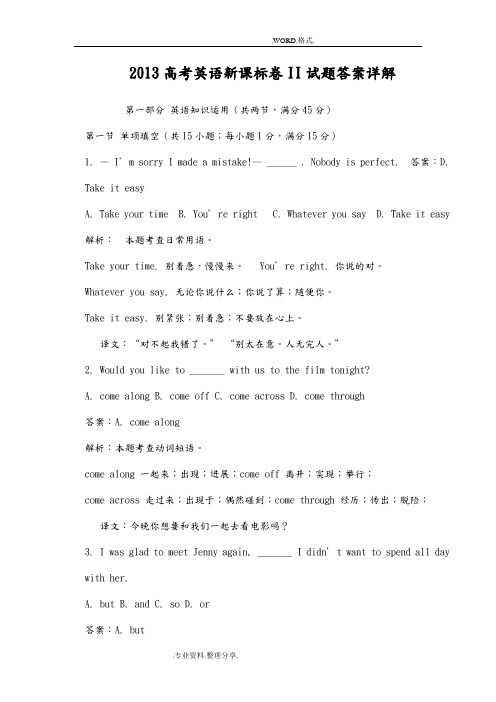
2013高考英语新课标卷II试题答案详解第一部分英语知识运用(共两节,满分45分)第一节单项填空(共15小题;每小题1分,满分15分)1. —I’m sorry I made a mistake!— ______ . Nobody is perfect. 答案:D. Take it easyA. Take your timeB. Yo u’re rightC. Whatever you sayD. Take it easy 解析:本题考查日常用语。
Take your time. 别着急,慢慢来。
You’re right. 你说的对。
Whatever you say. 无论你说什么;你说了算;随便你。
Take it easy. 别紧张;别着急;不要放在心上。
译文:“对不起我错了。
” “别太在意。
人无完人。
”2. Would you like to _______ with us to the film tonight?A. come alongB. come offC. come acrossD. come through答案:A. come along解析:本题考查动词短语。
come along 一起来;出现;进展;come off 离开;实现;举行;come across 走过来;出现于;偶然碰到;come through 经历;传出;脱险;译文:今晚你想要和我们一起去看电影吗?3. I was glad to meet Jenny again, _______ I didn’t want to spend all day with her.A. butB. andC. soD. or答案:A. but解析:本题考查连词。
but conj. 但是,表示转折关系;and conj. 并且,表示并列关系;so conj. 所以,表示因果关系;or conj. 或者,否则,表示选择关系;译文:我很高兴再次见到Jenny,但是我不想整天都和她呆在一起。
2014年高考新课标1全国卷英语试题及答案

2014年高考新课标1全国卷英语试题及答案2014年普通高等学校招生全国统一考试(新课标I)英语注意事项:1. 本试卷分第I卷(选择题)和第II卷(非选择题)两部分。
第I卷1至10页,第II卷11至13页。
2. 答题前,考生务必将自己的姓名、准考证号填写在本试卷相应的位置。
3. 全部答案在答题卡上完成,答在本试卷上无效。
4. 第I卷听力部分满分30分,不计入总分,考试成绩录取时提供给高校作参考。
5. 考试结束后,将本试卷和答题卡一并交回。
第I卷第一部分听力(共两节,满分30分)做题时,先将答案标在试卷上。
录音内容结束后,你将有两分钟的时间将试卷上的答案转涂到答题卡上。
第一节(共5小题;每小题1.5分,满分7.5分)听下面5段对话。
每段对话后有一个小题,从题中所给的A、B、C三个选项中选出最佳选项,并标在试卷的相应位置。
听完每段对话后,你都有10称钟的时间来回答有关小题如阅读下一小题。
每段对话仅读一遍。
例:How much is the shirt?A. £19.15.B. £9.18.C.£9.15.答案是 C。
1. What does the woman want to do?A. Find a place.B. Buy a map.C. Get an address.2. What will the man do for the woman?A. Repair her car.B. Give her a ride.C. Pick up her aunt.3. Who might Mr. Peterson be?A. A new professor.B. A department head.C. A company director.4. What does the man think of the book?A. Quite difficult.B. Very interesting.C. Too simple.5. What are the speakers talking about?A. Weather.B. Clothes.C. News.第二节(共15小题:每小题1.5分,满分22.5分)听下面5段对话或独白。
2014-2019年全国I II卷高考英语语法填空真题及答案

5. (2019全国卷II)阅读下面短文,在空白处填入1个适当的单词或括号内单词的正确形式。
Diets have changed in china-and so too has its top crop. Since 2011, the country61____ (grow) more corn than rice。Corn production has jumped nearly 125 percent over __62 __ past 25 years, while rice has increased only 7 percent.
We were first greeted with the barking by a pack___63___dogs, seven to be exact. They were well trained by their masters___64___had great experience with caring for these animals. Our hosts shared many of their experiences and___65___(recommend) wonderful places to eat, shop, and visit. For breakfast, we were able to eat papaya(木瓜) and other fruits from their trees in the backyard.
2014年高考大纲全国卷英语真题(带解析)
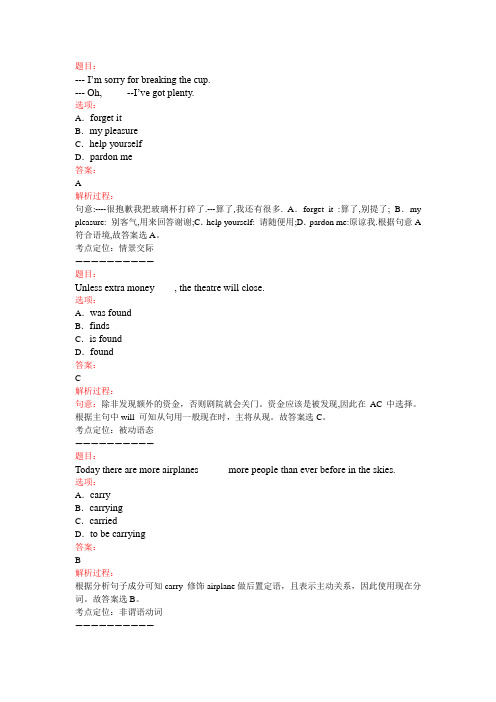
--- I’m sorry for breaking the cup.--- Oh, ____ --I’ve got plenty.选项:A.forget itB.my pleasureC.help yourselfD.pardon me答案:A解析过程:句意:----很抱歉我把玻璃杯打碎了.---算了,我还有很多.A.forget it :算了,别提了; B.my pleasure: 别客气,用来回答谢谢;C.help yourself: 请随便用;D.pardon me:原谅我.根据句意A 符合语境,故答案选A。
考点定位:情景交际——————————题目:Unless extra money____, the theatre will close.选项:A.was foundB.findsC.is foundD.found答案:C解析过程:句意:除非发现额外的资金,否则剧院就会关门。
资金应该是被发现,因此在AC中选择。
根据主句中will 可知从句用一般现在时,主将从现。
故答案选C。
考点定位:被动语态——————————题目:Today there are more airplanes _____ more people than ever before in the skies.选项:A.carryB.carryingC.carriedD.to be carrying答案:B解析过程:根据分析句子成分可知carry 修饰airplane做后置定语,且表示主动关系,因此使用现在分词。
故答案选B。
考点定位:非谓语动词——————————Exactly ____ the potato was introduced into Europe is uncertain, but it was probably around 1565.选项:A.whetherB.whyC.whenD.how答案:C解析过程:根据but后面―大概是在1565年左右‖,可知but前面想表达时间―土豆是什么时候引进到欧洲的还不确定‖,故答案选C。
2014年高考英语真题及答案详解(新课标全国卷Ⅰ)河南、河北、山西等地适用
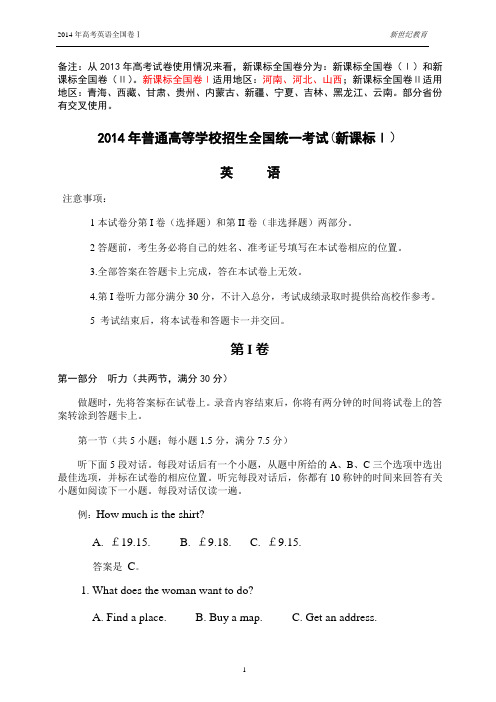
备注:从2013年高考试卷使用情况来看,新课标全国卷分为:新课标全国卷(Ⅰ)和新课标全国卷(Ⅱ)。
新课标全国卷Ⅰ适用地区:河南、河北、山西;新课标全国卷Ⅱ适用地区:青海、西藏、甘肃、贵州、内蒙古、新疆、宁夏、吉林、黑龙江、云南。
部分省份有交叉使用。
2014年普通高等学校招生全国统一考试(新课标Ⅰ)英语注意事项:1本试卷分第I卷(选择题)和第II卷(非选择题)两部分。
2答题前,考生务必将自己的姓名、准考证号填写在本试卷相应的位置。
3.全部答案在答题卡上完成,答在本试卷上无效。
4.第I卷听力部分满分30分,不计入总分,考试成绩录取时提供给高校作参考。
5 考试结束后,将本试卷和答题卡一并交回。
第I卷第一部分听力(共两节,满分30分)做题时,先将答案标在试卷上。
录音内容结束后,你将有两分钟的时间将试卷上的答案转涂到答题卡上。
第一节(共5小题;每小题1.5分,满分7.5分)听下面5段对话。
每段对话后有一个小题,从题中所给的A、B、C三个选项中选出最佳选项,并标在试卷的相应位置。
听完每段对话后,你都有10称钟的时间来回答有关小题如阅读下一小题。
每段对话仅读一遍。
例:How much is the shirt?A. £19.15.B. £9.18.C. £9.15.答案是C。
1. What does the woman want to do?A. Find a place.B. Buy a map.C. Get an address.2.What will the man do for the woman?A. Repair her car.B. Give her a ride.C. Pick up her aunt.3. Who might Mr. Peterson be?A. A new professor.B. A department head.C. A company director.4. What does the man think of the book?A. Quite difficult..B. Very interesting.C. Too simple.5. What are the speakers talking about?A. Weather.B. Clothes.C. News.第二节(共15小题;每小题1.5分,满分22.5分)听下面5段对话或独白。
2014全国高考四川卷英语(解析版)纯Word版
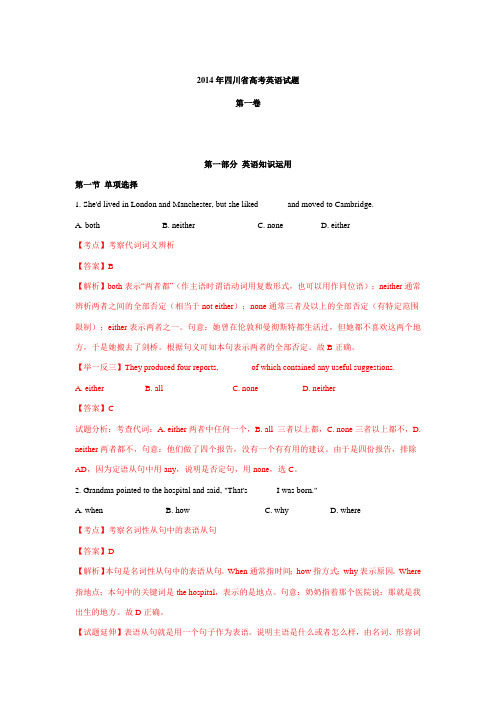
2014年四川省高考英语试题第一卷第一部分英语知识运用第一节单项选择1. She'd lived in London and Manchester, but she liked ______ and moved to Cambridge.A. bothB. neitherC. noneD. either【考点】考察代词词义辨析【答案】B【解析】both表示“两者都”(作主语时谓语动词用复数形式,也可以用作同位语);neither通常辨析两者之间的全部否定(相当于not either);none通常三者及以上的全部否定(有特定范围限制);either表示两者之一。
句意:她曾在伦敦和曼彻斯特都生活过,但她都不喜欢这两个地方,于是她搬去了剑桥。
根据句义可知本句表示两者的全部否定。
故B正确。
【举一反三】They produced four reports, _______ of which contained any useful suggestions.A. eitherB. allC. noneD. neither【答案】C试题分析:考查代词:A. either两者中任何一个,B. all 三者以上都,C. none三者以上都不,D. neither两者都不,句意:他们做了四个报告,没有一个有有用的建议。
由于是四份报告,排除AD,因为定语从句中用any,说明是否定句,用none,选C。
2. Grandma pointed to the hospital and said, "That's ______ I was born."A. whenB. howC. whyD. where【考点】考察名词性从句中的表语从句【答案】D【解析】本句是名词性从句中的表语从句。
When通常指时间;how指方式;why表示原因。
Where 指地点;本句中的关键词是the hospital,表示的是地点。
2014高考全国新课标II卷英语试题评价与解析
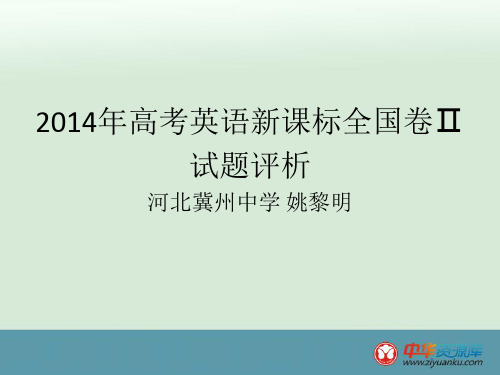
河北冀州中学 姚黎明
一.整体评价 1.难易适中,突出双基。
2.突出语境,淡化语法。 3.注重运用,贴近生活。 4.语境真实,语言地道。
二.试题结构动向: 1.去掉“单项选择”,摒弃单纯的语 法测试。 2.增加“语法填空”题,能力要求提 高。 客观题比重降低 主观题比重增加 单句层次 语篇层次
• 21. What did Rashid plan to do after his arrival in Sydney? A. Go shopping B. Find a house C. Join his family D. Take his family • 22. The girl‘s parents got Rashid‘s phone number from_______. A. a friend of his family B. a Sydney policeman C. a letter in his papers D. a stranger in Sydney
D.高频词汇,重点短语 1.the latest trend最新趋势 2.say of 对…有说法,就…谈看法 3.miss out on 将…漏掉,错过 4.be /keep exposed to 接触 5.popular popularity
29.What does that term‖ au pair‖ in the text mean? A. A mother raising her children on her own B. A child learning a foreign language at home C. A professor in language education of children D. A young foreign woman taking care of children. 30. Li Drake has her children study Chinese because she wants them ______. A. to live in China some day B. to speak the language at home C. to catch up wit other children D. to learn about the Chinese culture
2014年高考英语湖南卷(完整试题+答案+解析)
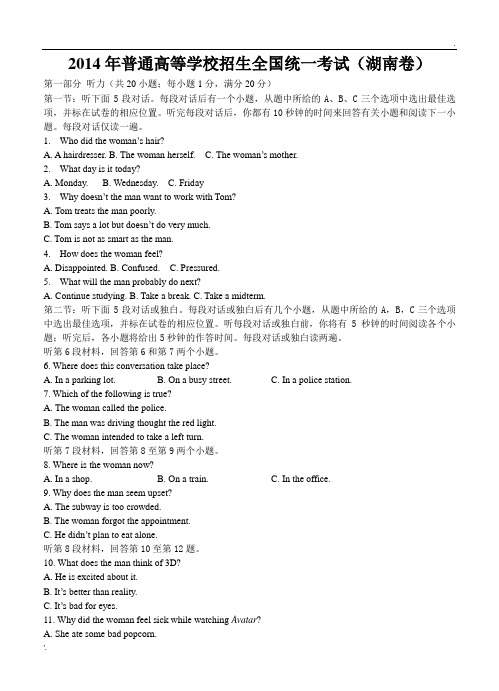
2014年普通高等学校招生全国统一考试(湖南卷)第一部分听力(共20小题;每小题1分,满分20分)第一节:听下面5段对话。
每段对话后有一个小题,从题中所给的A、B、C三个选项中选出最佳选项,并标在试卷的相应位置。
听完每段对话后,你都有10秒钟的时间来回答有关小题和阅读下一小题。
每段对话仅读一遍。
1.Who did the woman’s hair?A. A hairdresser.B. The woman herself.C. The woman’s mother.2.What day is it today?A. Monday.B. Wednesday.C. Friday3.Why doesn’t the man want to work with Tom?A. Tom treats the man poorly.B. Tom says a lot but doesn’t do very much.C. Tom is not as smart as the man.4.How does the woman feel?A. Disappointed.B. Confused.C. Pressured.5.What will the man probably do next?A. Continue studying.B. Take a break.C. Take a midterm.第二节:听下面5段对话或独白。
每段对话或独白后有几个小题,从题中所给的A,B,C三个选项中选出最佳选项,并标在试卷的相应位置。
听每段对话或独白前,你将有5秒钟的时间阅读各个小题;听完后,各小题将给出5秒钟的作答时间。
每段对话或独白读两遍。
听第6段材料,回答第6和第7两个小题。
6. Where does this conversation take place?A. In a parking lot.B. On a busy street.C. In a police station.7. Which of the following is true?A. The woman called the police.B. The man was driving thought the red light.C. The woman intended to take a left turn.听第7段材料,回答第8至第9两个小题。
2014年高考全国新课标二卷英语试题和答案解析

绝密★启用前:2015年6月8日15:002015年普通高等学校招生全国统一卷英语本试卷分第Ⅰ卷(选择题)和第Ⅱ卷(非选择题)两部分。
考试结束后,将本试卷和答题卡一并交回。
第Ⅰ卷注意事项:1. 答第Ⅰ卷前,考生务必将自己的姓名、准考证号填写在答题卡上。
2. 选出每小题答案后,用铅笔把答题卡上对应题目的答案标号涂黑。
如需改动,用橡皮擦干净后,再选涂其他答案标号。
不能答在本试卷上,否则无效。
第一部分阅读理解(共两节,满分40分)第一节(共15小题:每小题2分,满分30分)阅读下列短文,从每题所给的四个选项(A、B、C和D)中,选出最佳选项,并在答题卡上将该项涂黑。
AMy color television has given me nothing but a headache. I was able to buy it a little over a year ago because I had my relatives give me money for my birthday instead of a lot of clothes that wouldn’t fit.I let a salesclerk fool me into buying a discontinued model.I realized this a day late, when I saw newspaper advertisements for the set at seventy-five dollars less than I had paid. The set worked so beautifully when I first got it home that I would keep it on until stations signed off for the night. Fortunately, I didn’t got any channels showing all-night movies or I would never have gotten to bed.Then I started developing a problem with the set that involved static (静电) noise. For some reason, when certain shows switched into a commercial, a loud noise would sound for a few seconds. Gradually,this noise began to appear during a show, and to get rid of it, I had to change to another channel and then change it back. Sometimes this technique would not work, and I had to pick up the set and shake it to remove the sound. I actually began to build up my arm muscles(肌肉) shaking my set.When neither of these methods removed the static noise, I would sit helplessly and wait for the noise to go away. At last I ended up hitting the set with my fist, and it stopped working altogether. My trip to the repair shop cost me $62, and the set is working well now, but I keep expecting more trouble.1. Why did the author say he was fooled into buying the TV set?A. He got an older model than he had expected.B. He couldn’t return it when it was broken.C. He could have bought it at a lower price.D. He failed to find any movie shows on it.2.Which of the following can best re place the phrase”signed off”in Paragraph 1?A. ended all their programsB. provided fewer channelsC. changed to commercialsD. showed all-night movies3. How did the author finally get his TV set working again?A. By shaking and hitting it.B. By turning it on and off.C. By switching channels.D. By having it repaired.4. How does the another sound when telling the story ?A. CuriousB. AnxiousC. CautiousD. HumorousBYour house may have an effect on your figure. Experts say the way you design your home could play a role in whether you pack on the pounds or keep them off. You can make your environment work for you instead of against you. Here are some ways to turn your home into part of diet plan.Open the curtains and turn up the lights. Dark environments are more likely to encourage overeating, for people are often less self-conscious(难为情)when they’re in poorly lit places-and so more likely to eat lots of food. If your home doesn’t have enough window light, get more lamps and flood the place with brightness.Mind the colors. Research suggests warm colors fuel our appetites. In one study, people who ate meals in a blue room consumed 33 percent less than those in a yellow or red room. Warm colors like yellow make food appear more appetizing, while cold colors make us feel less hungry. So when it’s time to repaint, go blue.Don’t forget the clock-or the radio. People who eat slowly tend to consume about 70 fewer calories(卡路里)per meal than those who rush through their meals. Begin keeping track of the time, and try to make dinner last at least 30 minutes, And while you’re at it, actually sit down to eat. If you need some help slowing down, turn on relaxing music. It makes you less likely to rush through a meal.Downsize the dishes, Big serving bowls and plates can easily make us fat. We eat about 22 percent more when using a 12-inch plate instead of a 10-inch plate. When we choose a large spoon over a smaller one ,total intake(摄入)jumps by 14 percent. And we’ll pour about 30 percent more liquid into a short, wide glass than a tall, skinny glass.5. The text is especially helpful for those who care about_______.A. their home comfortsB. their body shapeC. house buyingD. healthy diets6. A home environment in blue can help people_________.A. digest food betterB. reduce food intakeC. burn more caloriesD. regain their appetites7. What are people advised to do at mealtimes?A. Eat quickly.B. Play fast music.C. Use smaller spoons.D. Turn down the lights.8. What can be a suitable title for the test?A. Is Your House Making You Fat?B. Ways of Serving DinnerC. Effects of Self-ConsciousnessD. Is Your Home Environment Relaxing?CMore student than ever before are taking a gap-year (间隔年)before going to university. It used to be called the “year off” between school and university.The gap-year phenomenon originated (起源) with the months left over to Oxbridge applicants between entrance exams in November and the start of the next academic year.This year, 25,310 students who have accepted places in higher education institutions have put off their entry until next year, according to statistics on university entrance provided by University and College Admissions Service(UCAS).That is a record 14.7% increase in the number of students taking a gap year. Tony Higgins from UCAS said that the statistics are good news for everyone in higher education. “Students who take a well-planned year out are more likely to be satisfied with, and complete, their chosen course. Students who take a gap year are often more mature and responsible,” he said.But not everyone is happy. Owain James, the president of the National Union of Students(NUS), argued that the increase is evidence of student had ship – young people are being forced into earning money before finishing their education. “New students are now aware that they are likely to leave university up to £15,000 in debt. It is not surprising that more and more students are taking a gap year to earn money to support their study for the degree.NUS statistics show that over 40% of students are forced to work during t erm time and the figure increases to 90% during vacation periods,” he said.9. What do we learn about the gap year from the text?A. It is flexible in length.B. It is a time for relaxation.C. It is increasingly popular.D. It is required by universities.10. According to Tony Higgins,students taking a gap year______.A. arc better prepared for college studiesB. know a lot more about their future jobsC. are more likely to leave university in debtD. have a better chance to enter top universities11. How does Owain James feel about the gap-year phenomenon?A. He's puzzled.B. He's worried.C. He's surprised.D. He's annoyed.12. What would most students do on their vacation according to NUS statistics?A. Attend additional courses.B. Make plans for the new term.C. Earn money for their education.D. Prepare for their graduate studies.DChoose Your One-Day ToursTour A—Bath & Stonehenge including entrance fees to the ancient Roman bathrooms and Stonehenge —£until 26 March and £39 thereafter.Visit the city with over 2,000 years of history and Bath Abbey, the Royal Crescent and the Costume Museum. Stonehenge is one of the world’s most famous prehistoric monuments dating back over 5,000 years.Tour B—Oxford & Stratford including entrance fees to the University St Mary’s Church Tower and Anne Hathaway's house一32 until 12 March and 36 thereafter.Oxford: Includes a guided of England’s oldest university city and colleges. Look over the “city of dreaming spires(尖顶)”form St Mary’s Church Tower. Stratford: Includes a guided tour exploring much of the Shakespeare wonder.Tour C—Windsor Castle & Hampton Court including entrance fees to Hampton Court Palace—£34 until March and £37 thereafter.Includes a guided tour of W indsor and Hampton Court, Henry Mill’s favorite palace. Free time to visit Windsor Castle (entrance fees not included). With 500 years of history, Hampton Court was once the home of four Kings and one Queen. Now this former royal palace is open to the public as a major tourist attraction. Visit the palace and its various historic gardens, which include the famous maze(迷宫)where it is easy to get lost!Tour D —Cambridge including entrance fees to the Tower of Saint Mary the Great —£33 until 18 March and £37 thereafter.Includes a guided tour of Cambridge, the famous university town, and the g ardens of the 18th century.13.Which tour will you choose if you want to see England’s oldest university city?A. Tour AB. Tour BC. Tour CD. Tour D14. Which of the following tours charges the lowest fee on 17 March?A. Windsor Castle & Hampton Court.B. Oxford & StratfordC. Bath &Stonehenge.D. Cambridge.15. Why is Hampton Court a major tourist attraction?A. It used to be the home of royal families.B. It used to be a well-known mazeC. It is the oldest palace in BritainD. It is a world-famous castle.第二节(共5小题:每小题2分,满分10分)根据短文内容,从短文后的选项中选出能填入空白处的最佳选项。
2014年浙江省英语高考试题及答案全国卷word版

2014年浙江省英语高考试题及答案全国卷第一部分:英语知识应用(共两节,满分30分)第一节:单项填空(共20小题,每小题0.5分,满分10分)从A、B、C和D四个选项中,选出可以填入空白处的最佳选项,并在答题纸上将该选项标号涂黑。
1. ---I am going to Spain fort a holiday soon.--- ______.A. It’s my pleasureB. Never mindC. Leave it aloneD. Good for you2. The paper is due next month, and I am working seven days ______ week, often long into______night.A. Aa; theB. the; 不填C. a; aD. 不填;the3.An average of just 18.75cm of rain fell last year, making ______ the driest year since Californiabecame a state in 1850.A. eachB. itC. thisD. one4.Joe is proud and ______, never admitting he is wrong and always looking for someone else to blame.A. strictB. sympatheticC. stubbornD. sensitive5.I don’t become a serious climber until the fifth grade, ______ I went up to rescue a kite that was stuckin the branches of a tree.A. whenB. whereC. whichD. why6.We most prefer to say yes to the ______ of someone we know and like.A. attemptsB. requestsC. doubtsD. promisesst week a tennis ball hit me on the head, but I tried to _______ the pain, believing that it would goaway sooner or later.A. shareB. realizeC. ignoreD. cause8.“Every time you eat a sweet, drink green tea.” This is _____ my mother used to tell me.A. whatB. howC. thatD. whether9.No matter how carefully you plan your finances, no one can _____ when the unexpected will happen.A. proveB. implyC. demandD. predict10.While staying in the village, James unselfishly shared whatever he had with the villagers withoutasking for anything ______ .A. in returnB. in commonC. in turnD. in place11.Sofia looked around at all the faces: she had the impression that she _____ most of the guests before.A. has seenB. had seenC. sawD. would see12.Facing up to your problem ____ running away from them is the best approach to working things out.A. more thanB. rather thanC. along withD.or rather19.The aim of education is to teach young people to think for themselves and not follow others ______ .A. blindlyB. unwillinglyC. closelyD. carefully14.Annie Salmon, disabled, is attended throughout her school days by a nurse _______ to guard her.A. to appointB. appointingC. appointedD. having appointed15.Cathy had quit her job when her son was born _______ she could stay home and raise her family.A.now thatB. as ifC. only ifD. so that16.They were abroad during the months when we were carrying out the investigation, or they _____ toour help.A. would have comeB. could comeC. have comeD. had come17.People won’t pay attention to you when they still have a lot of ideas of their own crying _______expression.A. fromB. overC. withD. for18.There’s no reason to be disappointed. ______, this could be rather amusing.A. Above allB. As a resultC. In additionD. As a matter of fact19.How could you ______ such a fantastic job when you have been out of work for months.A. turn offB. turn inC.turn downD. turn to20.—I’d like a wake-up call at 7:00 a.m., please!—OK, _______.A. help yourselfB. You will certainly make itC. just do what you likeD. I’ll make sure you get one 第二节:完形填空(共20小题;每小题1分,满分20分)阅读下面短文,掌握其大意,然后从21—40各题所给的四个选项中(A、B、C和D)中,选出最佳选项,并在答题纸上将该选项标号涂黑。
- 1、下载文档前请自行甄别文档内容的完整性,平台不提供额外的编辑、内容补充、找答案等附加服务。
- 2、"仅部分预览"的文档,不可在线预览部分如存在完整性等问题,可反馈申请退款(可完整预览的文档不适用该条件!)。
- 3、如文档侵犯您的权益,请联系客服反馈,我们会尽快为您处理(人工客服工作时间:9:00-18:30)。
2014年普通高等学校招生全国统一考试新课标II
卷
英语
本试卷分第I卷(选择题)和第II卷(非选择题)两部分。
考试结束后,将本试卷和答案卡一并交回。
注意事项:
1.答第I卷前考生务必将自己的姓名、准考证号填写在答题卡上。
2.选出每小题答案前,用2B铅笔把答题卡上对应题目的答案标号涂黑。
如需改动,用橡皮擦干净后,再选涂其他答案标号框,不能答在本试卷上,否则无效。
第一部分听力(共两节,满分30分)
做题时,先将答案标在试卷上。
录音内容结束后,你将有两分钟的时间将试卷上的答案转涂到答题卡上。
第一节(共5个小题:每小题1.5分,满分7.5分)
听下面5段对话。
每段对话后有一道小题,从每题所给的A B C三个选项中选出最佳选项,并标在试卷的相应位置。
听完每段对话后,你都有10秒钟的时间来回答有关小题和阅读下一小题。
每段对话仅读一遍。
例:How much is the shirt?
A. £19.15
B.£9.18
C. £9.15
答案是C
01. What does the woman want to do?
A. Find a place
B. Buy a map
C. Get an address
02. What will the man do for the woman?
A. Repair her car
B. Give her a ride
C. Pick up her aunt
03. Who might Mr. Peterson be?
A. A new professor.
B. A department head.
C.A company director
04. What does the man think of the book?
A. Quite difficult
B. Very
interesting C. Too simple
05. What are the speakers talking about?
A. Weather
B. Clothes
C. News
第二节(共15小题:每小题1.5分,满分22.5分)
听下面5段对话或对白,每段对话或对白后有几个小题,从题中所给的A、
B、C三个选项中选出最佳选项,并标在试卷的相应位置,听每段对话或独白前,
你将有时间阅读各个小题。
每小题5秒钟;听完后,各小题给出5秒钟的作答时间。
每段对话或独白读两遍。
听第6断材料,回答第6、7题。
06. Why is Harry unwilling to join woman?
A. He has a pain in his
knee. B. He wants watch TV.
C. He is too lazy.
07. What will the woman probably do next?
A. stay at home
B. Take Harry to hospital.
C. Do some exercise
听第7段材料,回答第8、9题
08. When will the man be home from work?
A. At 5:45
B. At
6:15 C. At 6:50
09. Where will the speakers go?
A. The Green House Cinema
B. The New State Cinema
C. The UME Cinema
听第8段材料,回答第10至12题。
10. How will the speakers go to New York?
A. By air
B. By Txi
C. By bus
11. Why are the speakers making the trip?
A. For business
B. For shopping
C. For holiday
12. What is the probable relationship between the speakers?
A. Driver and passenger
B. Husband and wife
C. Fellow workers
听第9段材料,回答第13至16题。
13. Where does this conversation probably take place?
A. In a restaurant
B. In an office
C.
In a classroom
14. What does John do now?
A. He’s trainer.
B. He’s a tour guide
C. He’s a college student
15. How much can a new person for the first year?
A. $10,500
B. $12,000
C. $15,000
16. How many people will the woman hire?
A. Four
B. Three
C. Two
听第10段材料,回答第17至20题。
17. How long has the speaker lived in a big city?
A. One year
B. Ten years
C. Eighteen years.
18. What is the speaker’s opinion on public transport?
A. It’s comfortable
B. It’s time-
saving C. It’s cheap
19. What is good about living in a small town?
A. It’s safer
B. It’s
healthier C. It’s more convenient
20. What kind of life does the speaker seem to like most?
A. Busy,
B. Colourful.
C. Quiet
第二部分阅读理解(共两节,满分40分)
第一节 (共15小题;每小题2分,满分40分)
阅读下列短文,从学科网每题所给的四个选项(A、B、C和D)中,选出最佳选项。
并在答题卡上将该选项涂黑.
A
Arriving in Sydney on his own from India, my husband, Rashid, stayed in a hotel for a short time while
looking for a short time while looking for a house for me and our children.
During the first week of his stay, he went out one day to do some shopping. He came back in the late afternoon to discover that his suitcase was gone. He was extremely worried as the suitcase had all his important papers, including his passport.
He reported the case to the police and then sat there,lost and lonely in strange city, thinking of the terrible troubles of getting all the paperwork organized again from a distant country while trying to settle down in a new one.
Late in the evening, the phone rang. It was a stranger. He was
trying to pronounce my husband’s name and was asking him a lot of questions. Then he said they had found a pile of papers in their trash can(垃圾桶)that had been left out on the footpath.
My husband rushed to their home to find a kind family holding all
his papers and documents. Their young daughter had gone to the trash can and found a pile of unfamiliar papers. Her parents had carefully sorted them out, although they had found mainly foreign addresses on most of
the documents. At last they had seen a half-written letter in the pile
in which my husband had given his new telephone number to a friend.。
